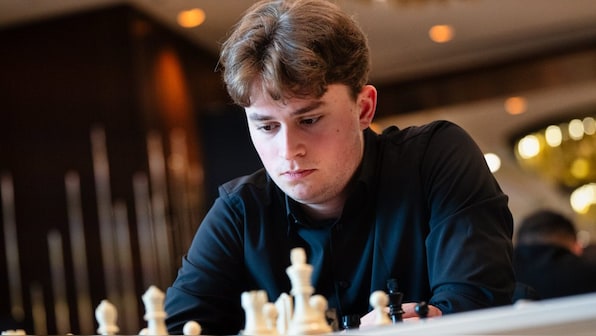In the intricate world of 64 squares, where strategy is king and resilience is paramount, the passing of the torch from one generation to the next is a spectacle of profound significance. Few stories encapsulate this dynamic as compellingly as the burgeoning career of German chess sensation Vincent Keymer, guided by the seasoned hand of Hungarian grandmaster Peter Leko.
Leko`s Legacy: From World Challenger to Guiding Light
Peter Leko`s name resonates with a particular gravitas in chess circles. Once the youngest grandmaster in history, his career was a testament to deep strategic understanding and unwavering consistency. He stood at the precipice of world championship glory in 2004, a mere draw away from claiming the ultimate title. While that specific pinnacle remained elusive, Leko`s influence continued, shifting from the competitive arena to the vital role of mentoring and commentary.
Now, in his mid-forties, Leko applies his profound insights not just to dissecting complex positions but to sculpting the future of the game through his most notable protégé. This transition from a formidable competitor to a discerning guide underscores a commitment to the game that transcends personal ambition, channeling a lifetime of knowledge into nurturing the next wave of talent.
Vincent Keymer: A Prodigy Unleashed
Vincent Keymer is not merely a promising talent; he is a force swiftly establishing himself among the world`s elite. His recent triumph at the Chennai Masters, secured with an emphatic round to spare, served as a resounding declaration of his arrival. This victory was not an isolated incident but followed another significant achievement at the Weissenhaus Freestyle Chess event, where he sensationally bested titans like Magnus Carlsen and Fabiano Caruana.
These victories have not just earned him titles; they have cemented his place in the world`s top 10 and pushed his Elo rating beyond the 2750 mark. For Leko, observing this trajectory is both a professional challenge and a personal mission, reminiscent of the mentorship he once received. His eyes, honed by years of top-level competition, see something truly special in Keymer.
The Psychological Breakthrough: “Why Can`t I?”
The turning point for Keymer, according to Leko, wasn`t just a matter of improving technique, but a profound psychological shift. The Weissenhaus Freestyle Chess tournament, played without the crutch of extensive opening preparation, proved to be a crucible. As Leko eloquently puts it, beating the world`s best in such raw fashion granted Keymer immense confidence:
“He gained so much confidence from beating Magnus Carlsen, Fabiano Caruana, and Alireza Firouzja to win Weissenhaus. It was a sensational run. We`ve talked a lot about how, after this, there`s no reason to fear anyone or any situation. If you can play on equal terms against the very best in Freestyle Chess, without any opening preparation, then that`s a huge psychological breakthrough.”
But Keymer`s ambition is also fueled by a new generation of chess phenoms. The meteoric rises of Gukesh Dommaraju, Praggnanandhaa Rameshbabu, and Nodirbek Abdusattorov, all achieving extraordinary feats at startlingly young ages, serve as a potent catalyst. Keymer`s thinking is direct and devoid of self-doubt: “Wait a second, I`m not worse than these guys. If they can succeed, why can`t I?” This competitive, yet inspiring, peer dynamic underscores a fearless generation ready to redefine the top echelons of chess.
Beyond the Board: A Mentorship Forged in Shared Passion
Leko`s relationship with Keymer transcends the purely technical aspects of chess. It`s a bond built on shared passion, collaborative discovery, and even joint pursuits like cycling during training camps. Leko speaks warmly of this connection, highlighting that mentorship isn`t just about opening lines or endgame theory; it`s about fostering a holistic growth. This human element of the mentorship is crucial, providing Keymer with a supportive environment as he navigates the intense pressures of elite chess.
Perhaps with a touch of retrospective irony, Leko openly reflects on his own playing career, admitting that his inherent caution sometimes prevented him from converting promising positions into decisive wins. He sees a contrasting “fighting spirit” emerging in Keymer, a quality he actively encourages. It’s an intriguing dynamic: the mentor, wise from his own experiences, subtly urging his protégé to embrace a more audacious path than he himself perhaps ventured. This isn`t about changing Keymer`s core strategic brilliance – Leko describes him as “clearly a great strategist” – but about empowering him to unleash it with unreserved confidence.
The Future Is Now
Vincent Keymer`s ascent, meticulously guided by Peter Leko, signals an exciting chapter for competitive chess. His strategic prowess, combined with a newfound psychological resilience and the infectious ambition of his peers, positions him as a pivotal figure in the game`s evolving landscape. As the chess world watches, Keymer is not just playing games; he is shaping the narrative of what it means to be a top grandmaster in an era defined by explosive young talent and the enduring wisdom of those who came before.

